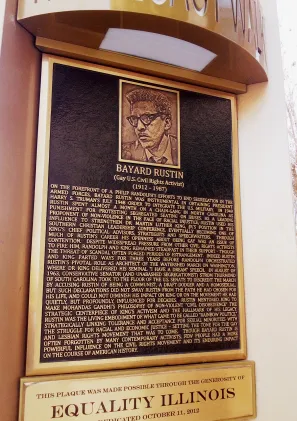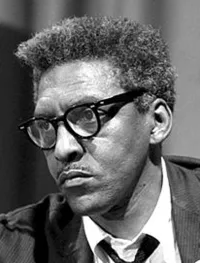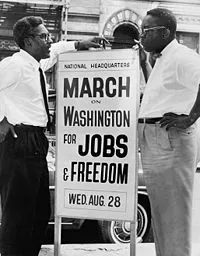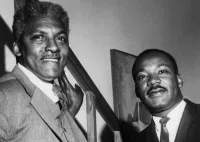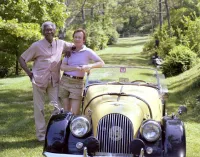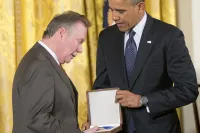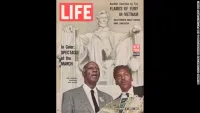Biography
1912 - 1987
"My activism did not spring from my being gay, or, for that matter, from my being black. Rather, it is rooted fundamentally in my Quaker upbringing and the values that were instilled in me by my grandparents who reared me."
- Bayard Rustin
On the forefront of A. Philip Randolph’s efforts to end segregation in the Armed Forces, Bayard Rustin was instrumental in obtaining President Harry S. Truman’s July 1948 order to integrate the U.S. military. In 1949 Rustin spent almost a month on a chain-gang in North Carolina as punishment for protesting segregated seating on buses. As a leading proponent of non-violence in the face of racial injustice, Rustin used his influence to strengthen Dr. Martin Luther King, Jr.’s position in the Southern Christian Leadership Conference, eventually becoming one of King’s chief political advisors, strategists and speechwriters. Through much of Rustin’s career his openness about being gay was an issue of contention. Despite widespread pressure from other civil rights activists to fire him, Randolph and King remained steadfast in their support - though the threat of scandal often forced periods of estrangement. Indeed Rustin and King parted ways for three years before Randolph orchestrated Rustin’s pivotal role as architect of the watershed March on Washington, where Dr. King delivered his seminal “I Have A Dream” speech. In August of 1963, conservative Senator (and unabashed segregationist) Strom Thurmond of South Carolina took to the floor of the U.S. Senate to discredit the March by accusing Rustin of being a Communist, a draft-dodger and a homosexual. But such declarations did not sway Rustin from the path he had chosen for his life, and could not diminish his impact on King or on the movement he had quietly, but profoundly, influenced for decades. Rustin mentored King to make Mohandas Gandhi’s philosophy of non-violent “Civil Disobedience” the strategic centerpiece of King’s activism and the hallmark of his legacy. Rustin was the living embodiment of what came to be called “Rainbow Politics,” strategically linking tolerance and acceptance for sexual minorities with the struggle for racial and economic justice – setting the tone for the Gay and Lesbian Rights Movement that was to come. Though Bayard Rustin is often forgotten by many contemporary activists, few people had a more powerful influence on the Civil Rights Movement and its enduring impact on the course of American History.
VIEW ENLARGED RUSTIN BRONZE MEMORIAL
1912 - 1987
"My activism did not spring from my being gay, or, for that matter, from my being black. Rather, it is rooted fundamentally in my Quaker upbringing and the values that were instilled in me by my grandparents who reared me."
- Bayard Rustin
On the forefront of A. Philip Randolph’s efforts to end segregation in the Armed Forces, Bayard Rustin was instrumental in obtaining President Harry S. Truman’s July 1948 order to integrate the U.S. military. In 1949 Rustin spent almost a month on a chain-gang in North Carolina as punishment for protesting segregated seating on buses. As a leading proponent of non-violence in the face of racial injustice, Rustin used his influence to strengthen Dr. Martin Luther King, Jr.’s position in the Southern Christian Leadership Conference, eventually becoming one of King’s chief political advisors, strategists and speechwriters. Through much of Rustin’s career his openness about being gay was an issue of contention. Despite widespread pressure from other civil rights activists to fire him, Randolph and King remained steadfast in their support - though the threat of scandal often forced periods of estrangement. Indeed Rustin and King parted ways for three years before Randolph orchestrated Rustin’s pivotal role as architect of the watershed March on Washington, where Dr. King delivered his seminal “I Have A Dream” speech. In August of 1963, conservative Senator (and unabashed segregationist) Strom Thurmond of South Carolina took to the floor of the U.S. Senate to discredit the March by accusing Rustin of being a Communist, a draft-dodger and a homosexual. But such declarations did not sway Rustin from the path he had chosen for his life, and could not diminish his impact on King or on the movement he had quietly, but profoundly, influenced for decades. Rustin mentored King to make Mohandas Gandhi’s philosophy of non-violent “Civil Disobedience” the strategic centerpiece of King’s activism and the hallmark of his legacy. Rustin was the living embodiment of what came to be called “Rainbow Politics,” strategically linking tolerance and acceptance for sexual minorities with the struggle for racial and economic justice – setting the tone for the Gay and Lesbian Rights Movement that was to come. Though Bayard Rustin is often forgotten by many contemporary activists, few people had a more powerful influence on the Civil Rights Movement and its enduring impact on the course of American History.
VIEW ENLARGED RUSTIN BRONZE MEMORIAL
Lesson Plan
Please login or register for an account to view this lesson plan.
Demography
Demography
Gender Male
Sexual Orientation Gay
Gender Identity Cisgender
Ethnicity African American Black
Nations Affiliated United States
Era/Epoch Civil Rights Movement (1954-1968) Information Age (1970-present) Post-Stonewall Era (1974-1980) World War II (1939-1945)
Field(s) of Contribution
Advocacy & Activism
Civics, Government, Politics, & Law
Journalism
Media & Communications
Politics
Social Justice
Social Sciences
US History
Commemorations & Honors
Head of the AFL–CIO's A. Philip Randolph Institute
Bayard Rustin LGBT Coalition Formed by the San Francisco Bay Area African-American LGBT Community Leaders (2007)
United States Department of Labor Hall of Honor Recipient (2013)
Posthumous Presidential Medal of Freedom Award For Activism (2013)
Inaugural San Francisco Rainbow Honor Walk Honoree (2014)
Greensboro Mural Project at the New Garden Friends Meeting in Greensboro, NC (2016)
National LGBTQ Wall of Honor at the Stonewall National Monument Inductee (2019)
Posthumous Pardon by California Governor Gavin Newsom (2020)
North Carolina District Court Judges Posthumously Vacates Rustin and Other Freedom Riders Convictions on 75th Anniversary (2022)
Demography
Gender Male
Sexual Orientation Gay
Gender Identity Cisgender
Ethnicity African American Black
Nations Affiliated United States
Era/Epoch Civil Rights Movement (1954-1968) Information Age (1970-present) Post-Stonewall Era (1974-1980) World War II (1939-1945)
Field(s) of Contribution
Advocacy & Activism
Civics, Government, Politics, & Law
Journalism
Media & Communications
Politics
Social Justice
Social Sciences
US History
Commemorations & Honors
Head of the AFL–CIO's A. Philip Randolph Institute
Bayard Rustin LGBT Coalition Formed by the San Francisco Bay Area African-American LGBT Community Leaders (2007)
United States Department of Labor Hall of Honor Recipient (2013)
Posthumous Presidential Medal of Freedom Award For Activism (2013)
Inaugural San Francisco Rainbow Honor Walk Honoree (2014)
Greensboro Mural Project at the New Garden Friends Meeting in Greensboro, NC (2016)
National LGBTQ Wall of Honor at the Stonewall National Monument Inductee (2019)
Posthumous Pardon by California Governor Gavin Newsom (2020)
North Carolina District Court Judges Posthumously Vacates Rustin and Other Freedom Riders Convictions on 75th Anniversary (2022)
Resources
Resources
Anderson, Jervis. Bayard Rustin: Troubles I've Seen: A Biography. Berkeley: University of California Press, 1998.
Carbado, Devon W. and Weise, Donald, eds. Time on Two Crosses: The Collected Writings of Bayard Rustin. San Francisco: Cleis Press, 2003.
D'Emilio, John. "Homophobia and the Trajectory of Postwar American Radicalism: The Career of Bayard Rustin." Modern American Queer History. Allida M. Black, ed. Philadelphia: Temple University Press, 2001. 79-99.
D'Emilio, John. Lost Prophet: The Life and Times of Bayard Rustin. New York: Free Press, 2003.
Levine, Daniel. Bayard Rustin and the Civil Rights Movement. New Jersey: Rutgers University Press, 1999.
Rustin, Bayard. Down the Line: The Collected Writings of Bayard Rustin. Chicago: Quadrangle Books, 1971.
Rustin, Bayard. Strategies for Freedom: The Changing Patters of Black Protest. New York: Columbia University Press, 1976.
http://www.pbs.org/pov/brotheroutsider/
https://www.britannica.com/biography/Bayard-Rustin
https://www.nps.gov/subjects/civilrights/bayard-rustin.htm
https://www.biography.com/activists/bayard-rustin
https://aflcio.org/about/history/labor-history-people/bayard-rustin
https://freedomhouse.org/article/bayard-rustin-and-struggle-equality
https://vault.fbi.gov/bayard-rustin
https://www.quakersintheworld.org/quakers-in-action/160/Bayard-Rustin
https://www.theguardian.com/world/2013/aug/23/bayard-rustin-march-on-washington
https://www.essence.com/news/bayard-rustin-posthumously-pardoned/
https://www.history.com/news/bayard-rustin-march-on-washington-openly-gay-mlk
https://www.nytimes.com/2020/02/05/us/bayard-rustin-pardon.html
https://www.washingtonpost.com/history/2020/01/21/bayard-rustin-gay-pardon/
https://www.zinnedproject.org/materials/i-must-resist
https://obamawhitehouse.archives.gov/blog/2013/08/27/bayard-rustin-american-hero-no-longer-forgotten
https://www.dol.gov/general/aboutdol/hallofhonor/2013_rustin
Resources
Anderson, Jervis. Bayard Rustin: Troubles I've Seen: A Biography. Berkeley: University of California Press, 1998.
Carbado, Devon W. and Weise, Donald, eds. Time on Two Crosses: The Collected Writings of Bayard Rustin. San Francisco: Cleis Press, 2003.
D'Emilio, John. "Homophobia and the Trajectory of Postwar American Radicalism: The Career of Bayard Rustin." Modern American Queer History. Allida M. Black, ed. Philadelphia: Temple University Press, 2001. 79-99.
D'Emilio, John. Lost Prophet: The Life and Times of Bayard Rustin. New York: Free Press, 2003.
Levine, Daniel. Bayard Rustin and the Civil Rights Movement. New Jersey: Rutgers University Press, 1999.
Rustin, Bayard. Down the Line: The Collected Writings of Bayard Rustin. Chicago: Quadrangle Books, 1971.
Rustin, Bayard. Strategies for Freedom: The Changing Patters of Black Protest. New York: Columbia University Press, 1976.
http://www.pbs.org/pov/brotheroutsider/
https://www.britannica.com/biography/Bayard-Rustin
https://www.nps.gov/subjects/civilrights/bayard-rustin.htm
https://www.biography.com/activists/bayard-rustin
https://aflcio.org/about/history/labor-history-people/bayard-rustin
https://freedomhouse.org/article/bayard-rustin-and-struggle-equality
https://vault.fbi.gov/bayard-rustin
https://www.quakersintheworld.org/quakers-in-action/160/Bayard-Rustin
https://www.theguardian.com/world/2013/aug/23/bayard-rustin-march-on-washington
https://www.essence.com/news/bayard-rustin-posthumously-pardoned/
https://www.history.com/news/bayard-rustin-march-on-washington-openly-gay-mlk
https://www.nytimes.com/2020/02/05/us/bayard-rustin-pardon.html
https://www.washingtonpost.com/history/2020/01/21/bayard-rustin-gay-pardon/
https://www.zinnedproject.org/materials/i-must-resist
https://obamawhitehouse.archives.gov/blog/2013/08/27/bayard-rustin-american-hero-no-longer-forgotten
https://www.dol.gov/general/aboutdol/hallofhonor/2013_rustin
